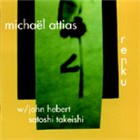Home » Jazz Articles » Album Review » Micha: Renku
Micha: Renku
Renku is, by strict definition, a smaller, more rigidly-structured subset of the Renga, with three line haikus (five syllables/seven syllables/seven syllables) alternating with two-line stanzas of seven syllables each. Attias, who's as comfortable with complex postmodern composition as more open-ended improvisation, employs that definition as the basis for the title track, using the total of thirty-one as a metric structure to be broken down and built up in a variety of ways. It's a fine example of this trio's fundamental premise to make form and freedom coexist, blurring easy delineation.
Of these three players, Attias is the least-known and the least-recorded. Hebert's highest profile gig is as member of saxophonist John O'Gallagher's Axiom group, but his supple and unrestrained playing has become an increasingly common fixture on the New York scene. Takeishi has worked with artists including saxophonist Tom Christensen and pianist Eliane Elias. He's also a member of cellist Erik Friedlander's eclectic Topaz group, another unit devoted to breaking down preconceived boundaries, which was responsible for 2003's remarkable Quake. Takeishi is typically heard on his oddly-designed traditional drum kit/hand percussion hybrid; but on Renku he plays just a drum set, although in his hands that's by no means a limitation.
Sax/bass/drums trios often sound like a quartet missing a member, but Renku manages to come across as complete and self-contained. Seven of the album's twelve tracks are by Attias. They range from "Dark Net, which, despite all manner of displaced beats, retains a certain sense of swing, to the more rhythmically insistent "The Crunch. Hebert's two contributions are the darkly balladic "Hotel New #1 and "Ciao Monkey, which begins in an even more brooding fashion before shifting into a periodically broken-up high-energy vamp, with Attias extending his baritone's range with controlled multiphonics. Two brief group improvs and an appropriately quirky look at Thelonious Monk's lesser-known "Work round out the set.
Throughout the recording, Attias demonstrates rare skill and depth on soprano, alto, and baritone saxophones. Unlike many players who favor one instrument in particular, Attias feels completely at home on all three horns. He's capable of extremes, but he tends to avoid the brashness so often associated with the kind of form-based free exchange in which the trio regularly engages.
But the strength of Renku lies not in the trio members' clear individual talents. Instead, it's their ability to create a collective sound—on one hand spare, on the other surprisingly full—demonstrating clear conception, even at its most liberal, and unequivocal focus.
Track Listing
Dark Net; The Crunch; Renku; King Fish; Slow Arrows; Lumbago Boogaloo; Hotel New #1; Horse Fly; Loom; Ciao Monkey; Snow; Work.
Personnel
Michael Attias
saxophoneMicha
Album information
Title: Renku | Year Released: 2005 | Record Label: Playscape Recordings
< Previous
Libert
Next >
Backstabber's Ball
Comments
About Michael Attias
Instrument: Saxophone
Related Articles | Concerts | Albums | Photos | Similar ToTags
For the Love of Jazz
 All About Jazz has been a pillar of jazz since 1995, championing it as an art form and, more importantly, supporting the musicians who create it. Our enduring commitment has made "AAJ" one of the most culturally important websites of its kind, read by hundreds of thousands of fans, musicians and industry figures every month.
All About Jazz has been a pillar of jazz since 1995, championing it as an art form and, more importantly, supporting the musicians who create it. Our enduring commitment has made "AAJ" one of the most culturally important websites of its kind, read by hundreds of thousands of fans, musicians and industry figures every month.




















